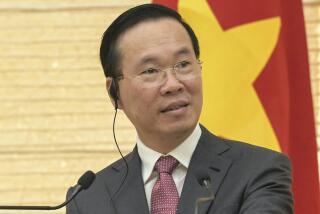In China Corruption Case, It’s Prison for ‘Princeling’
- Share via
BEIJING — He was one of China’s flashiest young playboys, sporting around the capital in a BMW and using connections provided by his powerful father to cut dubious business deals and entertain hundreds of guests at lavish banquets.
Today, Chen Xiaotong is in prison serving a 12-year sentence for accepting bribes and “diverting public funds,” officials of the Beijing court system said Tuesday.
Chen, son of disgraced former Beijing Communist Party chief Chen Xitong, is being held up by the Chinese leadership as an example of its determination to eliminate widespread abuse of power by the sons and daughters of the elite. His recent conviction comes as the Communists prepare for a critical party congress, probably next month.
Opinion polls list official corruption and nepotism by party officials as two of the main public complaints against the country’s leadership. As it prepares to enter its second half-century of rule, marked by the upcoming 15th Party Congress, the party leadership is intent on showing it is serious about cracking down on corruption.
According to a Beijing Supreme Court spokesman, the younger Chen, 41, was sentenced in a closed hearing June 28 to six years in prison for accepting bribes and seven years in prison for misuse of public funds. According to the court spokesman, the sentence was rounded off to 12 years. Chen was also deprived of his political rights for three years.
The sentence, although substantial, was still less than those given by Chinese courts in many political cases. Celebrated political dissident Wei Jingsheng, for example, was sentenced in 1996 to a 14-year term in prison for his writings advocating democracy. In 1979, Wei was sentenced to a 15-year term for “counterrevolutionary” writings that would be considered mild opposition by most international standards.
Also last year, student political activist Wang Dan, an organizer of the 1989 student democracy movement in Beijing’s Tiananmen Square, received an 11-year sentence on charges of “subverting the state.” Wang’s alleged crimes included taking a correspondence course from the University of California.
The Chen corruption case is important because it is one of two recent high-profile prosecutions of China’s “princelings”--the name used to describe the privileged children of the Communist Party leadership. The younger Chen, a former president of a Sino-Japanese luxury hotel here, was notorious in the capital for accepting bribes in exchange for purported political favors.
According to a rare expose in the Chinese press--a 1995 article in Southern Weekend, a Communist Party newspaper published in Guangdong province--Chen reportedly demanded $93,000 to arrange an audience with a senior government official. He also reportedly diverted money to his father’s mistress and helped her escape to Hong Kong when the corruption scandal first broke two years ago with the suicide of a Beijing vice mayor implicated in the case.
Chen has been detained since 1995, but details of his prosecution and sentencing were not publicly revealed until Tuesday.
In another high-profile case, Zhou Beifang, the son of senior state industrialist and influential party member Zhou Guanwu, was sentenced to prison last year for graft. The elder Zhou, longtime chairman of the massive Beijing steelworks Capital Iron & Steel Corp. and crony of the late Chinese leader Deng Xiaoping, was forced to resign his post after his son’s arrest.
Significantly, the government’s harshest punishment in the corruption crackdown has been reserved for the sons of the prominent fathers.
Chen Xitong, the former Beijing party chief, and the elder Zhou are both reportedly under house arrest. According to the Reuters news agency, internal party documents link both of the elder leaders to corruption cases involving many millions of dollars in misappropriated public funds.
So far, however, the government has not announced any criminal prosecution or sentencing of the two fathers. Critics contend that the true test of the government’s--and the Communist Party leadership’s--seriousness in rooting out corruption will come when men of this level take the fall.
More to Read
Sign up for Essential California
The most important California stories and recommendations in your inbox every morning.
You may occasionally receive promotional content from the Los Angeles Times.










